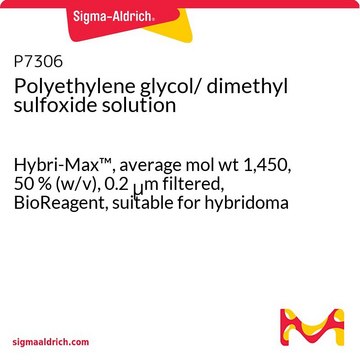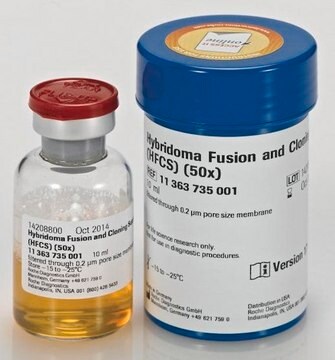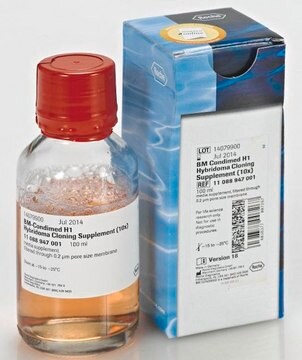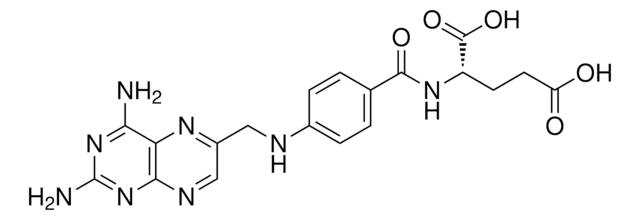P7181
Polyethylene glycol solution
Hybri-Max™, 50 % (w/v), average mol wt 1,450, 0.2 μm filtered, BioReagent, suitable for hybridoma
Synonym(s):
PEG Solution, Polyethylene Glycol
Sign Into View Organizational & Contract Pricing
All Photos(1)
About This Item
Recommended Products
grade
Hybri-Max™
Quality Level
sterility
0.2 μm filtered
product line
BioReagent
form
solution
mol wt
average mol wt 1,450
concentration
50 % (w/v)
technique(s)
cell culture | hybridoma: suitable
impurities
endotoxin, tested
storage temp.
2-8°C
SMILES string
C(CO)O
InChI
1S/C2H6O2/c3-1-2-4/h3-4H,1-2H2
InChI key
LYCAIKOWRPUZTN-UHFFFAOYSA-N
Related Categories
General description
Polyethylene glycol (PEG) is a polymer of ethylene oxide and water, obtained upon condensation.
Application
Polyethylene glycol solution has been used in the hybridization of the following:
- irradiated camel fibroblast cells with A23 hamster cells
- mouse splenocytes with Sp2/0-Ag 14 mouse myeloma cells
- rabbit splenocytes and cell line 240E-1
Recommended for use in a normal fusion protocol requiring 50% PEG.
PEG is used as a fusogen to obtain hybridomas for monoclonal antibody production. Induces cell hybridization.
PEG is used as a fusogen to obtain hybridomas for monoclonal antibody production. Induces cell hybridization.
Biochem/physiol Actions
Polyethylene glycol (PEG) is used in detergents, emulsifying agents, soaps, metal costing process, pharmaceutical preparations and cosmetics. PEG is commonly used as a lubricant. It′s application is also observed in chromatographic stationary phases. PEG prevents crystal formation in emulsions.
Packaging
Packaged in sealed ampules under nitrogen.
Other Notes
Contains 50% (w/v) polyethylene glycol (Av. Mol. Wt. 1450) in DPBS without calcium.
Reconstitution
Solution is ready-to-use. If a less concentrated solution is desired, dilute with sterile DPBS without calcium (D5773). Some precipitate may appear after being exposed to cooler, but should disappear as the solution warms. Solution may be frozen if desired but should first be aliquotted to avoid repeated freeze/thaw cycles.
Legal Information
Hybri-Max is a trademark of Sigma-Aldrich Co. LLC
Storage Class Code
10 - Combustible liquids
WGK
WGK 1
Flash Point(F)
212.0 °F - closed cup
Flash Point(C)
100 °C - closed cup
Personal Protective Equipment
dust mask type N95 (US), Eyeshields, Gloves
Choose from one of the most recent versions:
Already Own This Product?
Find documentation for the products that you have recently purchased in the Document Library.
Customers Also Viewed
Fatima Amanat et al.
mBio, 12(4), e0100221-e0100221 (2021-07-28)
After first emerging in late 2019 in China, severe acute respiratory syndrome coronavirus 2 (SARS-CoV-2) has since caused a pandemic leading to millions of infections and deaths worldwide. Vaccines have been developed and authorized, but the supply of these vaccines
Zhengrong Zhang et al.
Cell death and differentiation, 28(9), 2765-2777 (2021-04-22)
The severe acute respiratory syndrome coronavirus 2 (SARS-CoV-2) virus is highly contagious and causes lymphocytopenia, but the underlying mechanisms are poorly understood. We demonstrate here that heterotypic cell-in-cell structures with lymphocytes inside multinucleate syncytia are prevalent in the lung tissues
Construction of two whole genome radiation hybrid panels for dromedary (Camelus dromedarius): 5000 RAD and 15000 RAD
Perelman PL, et al.
Scientific reports, 8(1), 1982-1982 (2018)
Retinol encapsulated into amorphous Ca2+ polyphosphate nanospheres acts synergistically in MC3T3-E1 cells
Muller WEG, et al.
European Journal of Pharmaceutics and Biopharmaceutics, 93(2), 214-223 (2015)
Development of Monoclonal Antibodies against CMP-N-Acetylneuraminate-beta-galactosamide-alpha-2, 3-sialyltransferase 1 (ST3Gal-I) Recombinant Protein Expressed in E. coli
Gupta AK, et al.
Biochemistry Research International, 2015(1), 1982-1982 (2015)
Our team of scientists has experience in all areas of research including Life Science, Material Science, Chemical Synthesis, Chromatography, Analytical and many others.
Contact Technical Service




